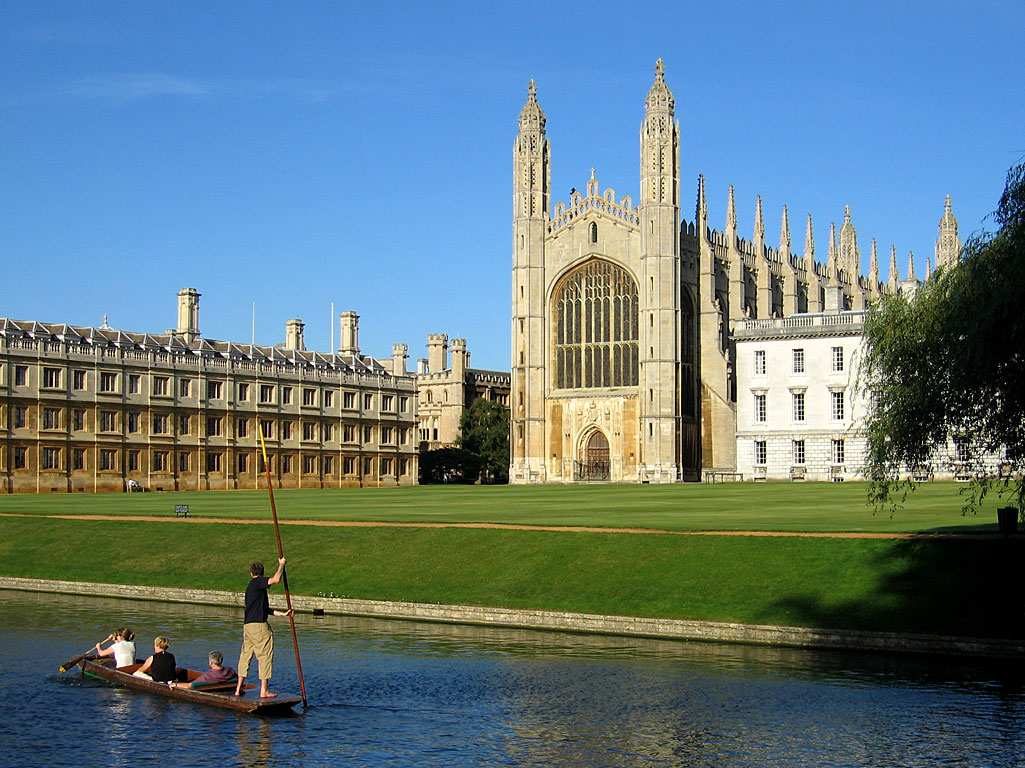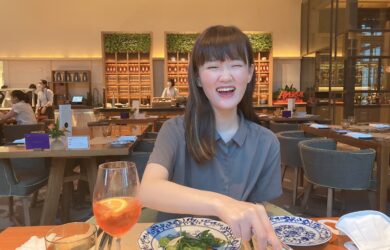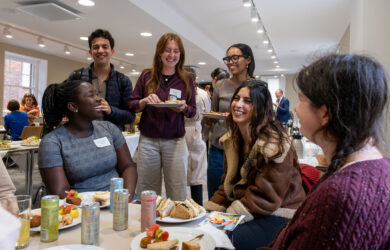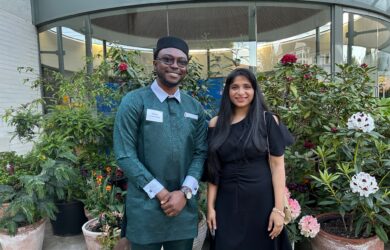
Gates Cambridge is pleased to announce the 23 new US scholars who will begin their studies this autumn
We know that these scholars – and those we announce in early April from other parts of the world – will flourish in the rich, international community at Cambridge and will go on to make a significant impact in their fields and to the wider global community.
Professor Eilis Ferran
Twenty three of the most academically outstanding and socially committed US citizens have been selected to be part of the 2023 class of Gates Cambridge Scholars at the University of Cambridge.
The US Scholars-elect, who will take up their awards this October, are from a wide range of backgrounds. They come from 24 universities across the United States and beyond, including four institutions that have for the first time produced a Gates Cambridge Scholar (Hunter College (CUNY) in New York, Towson University in Maryland, Hochschule RheinMain (HSRM) in Germany and St Olaf College in Minnesota).
Sixteen are women and seven are men. Fourteen will pursue PhDs while nine will undertake one-year master’s degrees.
They include:
Briseyda Barrientos Ariza who will do a Master of Philosophy [MPhil] in European, Latin American and Comparative Literatures and Cultures. The first Gates Cambridge Scholar from Towson University in Maryland, she collected the oral histories of Guatemalans about their encounters with regional folkloric figures and how these reflect symptoms of colonial trauma. At Cambridge she will broaden her work to look at how oral history and the intergenerational stories told by the Central American diaspora reframe the violence and the experiences of oppressed groups.
Christopher Slaughter who will do a PhD in Engineering. He did his undergraduate degree in Computer Engineering at the University of Maryland Baltimore County, where he researched biosensor technologies addressing challenges in affordability and sustainability to be used in biomedicine and the bioprocess. For his PhD, he will look to create point-of-care technology for screening, diagnosing and tracking neuromuscular disease progression. Christopher is President of the National Society of Black Engineers (NSBE) and is responsible for coordinating campus-wide events dedicated to increasing the number of Black engineers. He also mentors local Black students to pursue higher education.
Jannathul Chowdhury who will do an MPhil in Education. For the last four years, she has been teaching K-12 students and helping thousands of first generation students with college matriculation and will be graduating in May with a teaching certification and undergraduate dual degree in adolescent education and history from City University of New York Hunter College. For her MPhil on the Knowledge, Power and Politics programme she will research the ways that inclusive curricula can work for multicultural students. She says: “I witnessed first-hand the disparities that existed for students with immigrant backgrounds in the public educational system. South Asian immigrants, like myself, often come from a culture where disability education and female education is stigmatised, and this creates further barriers for first-gen students in the educational system. Knowing this, I knew I wanted to make a difference in the field of education.”
Bennett Weissenbach who will do a PhD in Polar Studies. Bennett is a journalist and writer whose work explores the relationship between his generation’s environmental and technological inheritance. As an undergraduate at Princeton until 2020, he lived with scientists in Alaska, visiting the largest glacier in the American Arctic, being off-grid in winter to research permafrost and walking and packrafting across the Brooks Range to study the boreal forest’s poleward migration. In 2020 he reported on COVID-19 and the climate crisis in Nepal. His work has appeared in numerous publications, from the National Geographic to The Washington Post and he is currently writing a book on his journeys into the Alaskan wilderness to study climate change and the effects of digital media on contemporary ideas about nature.
Julia Maybury who will do a PhD in Psychology. She has been studying the way the Covid pandemic influenced the relationship between sleep and personal memory at Boston College’s Cognitive and Affective Neuroscience Laboratory. Her master’s research was on the role of sleep stages in the consolidation of emotional memories across the lifespan. Her PhD will investigate how sleep patterns influence brain activation and connectivity when retrieving emotional memories. She says: “My long-term aim is to discover interventions that positively influence those suffering from maladaptive memories underlying conditions including anxiety, PTSD, and Alzheimer’s, that could also enhance the health of personal memories for all.”
Stanislav Delaurentiis who will do a PhD in Applied Mathematics and Theoretical Physics. He did his undergraduate degree in Astrophysics at Columbia University. For his PhD he will work with the Theoretical Astrophysics group to study the galactic centre, focusing on characterising the fluid and planetary dynamics that govern Super-Massive Black Hole accretion disks and the objects that are embedded within them. A member of Columbia University Chinese Students Club, Stanislav is also passionate about democratising science education and developing a diverse and international community of scientists.
The 23 US Scholars-elect will study and research subjects ranging from how to create technology for screening, diagnosing and tracking neuromuscular disease progression to investigating a greener way to perform industrial chemical separations to solar-driven desalination.
The prestigious postgraduate scholarship programme – which fully funds postgraduate study and research in any subject at the University of Cambridge – was established through a US$210 million donation to the University of Cambridge from the Bill and Melinda Gates Foundation in 2000; this remains the largest single donation to a UK university. Since the first class in 2001, Gates Cambridge has awarded 2,104 scholarships to scholars from 111 countries who represent more than 700 universities globally (more than 200 in the USA) and almost 90 academic departments and all 31 Colleges at Cambridge.
In addition to outstanding academic achievement the programme places an emphasis on social leadership in its selection process. The programme’s aim is to create a global network of future leaders committed to improving the lives of others.
The US Scholars-elect will join around 60 Scholars from other parts of the world, who will be announced in early April. The full class of 2023 will join current Gates Cambridge Scholars in October to form a community of almost 300 current Scholars in residence at the world-leading University of Cambridge.
Professor Eilis Ferran, Provost of the Gates Cambridge Trust, said: “I’m delighted to announce the US cohort of the Gates Cambridge class of 2023. These scholars, who have been selected by our expert Selection Panels, reflect the mission of the Gates Cambridge Trust established through the Bill and Melinda Gates Foundation’s generous and historic gift to the University of Cambridge. Like their predecessors, they are both intellectually outstanding and demonstrate the kind of leadership qualities needed to tackle the complex global challenges we face today. We know that these scholars – and those we announce in early April from other parts of the world – will flourish in the rich, international community at Cambridge and will go on to make a significant impact in their fields and to the wider global community.”
*Full bios and photos of the Scholars-elect are available from our Directory page. Picture credit: King’s College chapel c/o Wikimedia commons.












